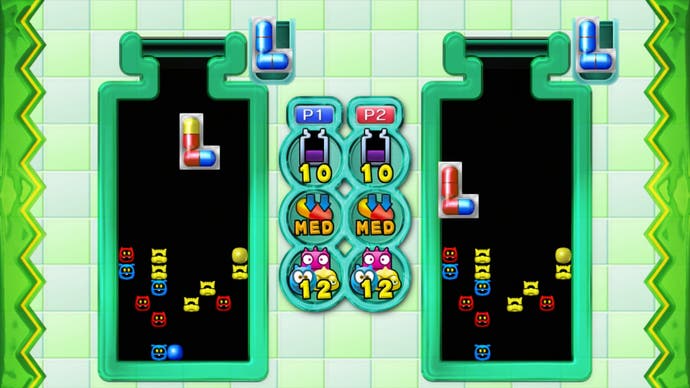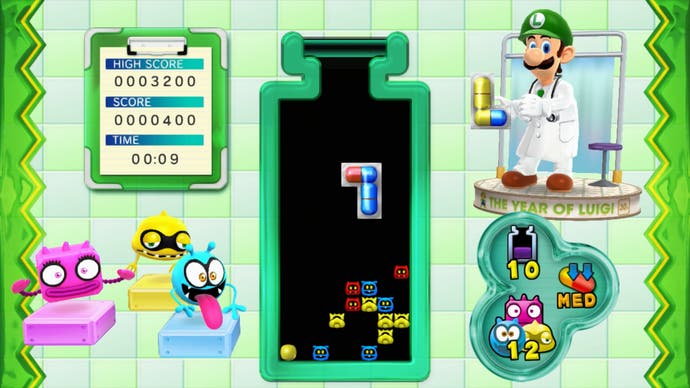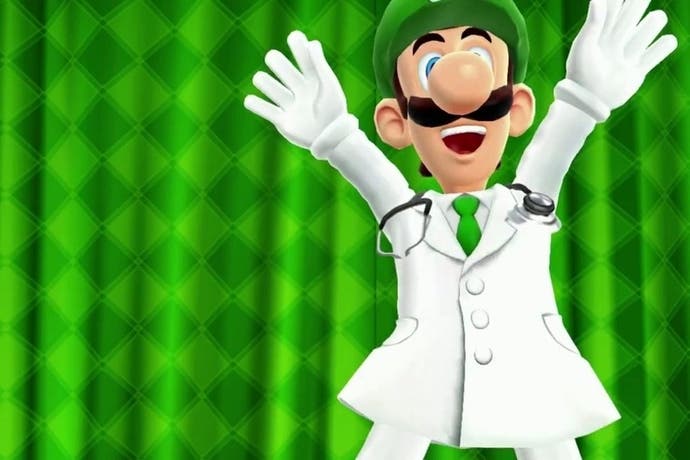Dr Luigi review
Going viral.
Nintendo has published plenty of classic puzzlers over the years, and Dr Mario - the NES and Game Boy game now remade in Luigi's image for Wii U - is widely considered to be one of them. In truth, it's probably most fondly remembered for its soundtrack, by Hirokazu "Hip" Tanaka, the guy Nintendo would call upon to compose a catchy melody or two whenever Koji Kondo was busy. Its main theme is the sort of tune you mightn't be able to recall from memory, but after about five seconds you'll be humming along to it, before spending the rest of the day trying to extricate it from your brain.
Earworms aside, I'm not convinced Dr Mario is all that great a puzzle game. It arrived at a time when Nintendo spent as much time retooling existing ideas as coming up with its own. In all likelihood, then-president Hiroshi Yamauchi wanted another Tetris to cash in on the roaring success of Pajitnov's masterpiece, and Gunpei Yokoi's match-four variant happened to fit the bill.
While it's hardly Yokoi's finest hour, there is a certain purity to its design. A medicine bottle is infested with more irritating bugs than your average Techland game, and it's your job to get rid of them by dropping coloured capsules onto their heads. Line up four objects of the same colour, horizontally or vertically, and they'll be removed from play, whether they are bugs or pill halves or both.

It's a simple idea in theory, but it gets tricky surprisingly quickly. It's all too easy to focus on killing one or two viruses and end up in a tight spot, with several layers to remove before you can get at the ones clinging on at the bottom of the bottle. As with most puzzlers, you'll have to think several turns ahead, positioning pills so that overhanging pieces drop down onto the right coloured bugs - or better still, arranging them so that a single match prompts a chain reaction, with a jaunty little jingle your reward for pulling off such a combo. Clear all the viruses and you move onto the next level, with more malevolent microbes to massacre.
There's an art to it, but even when it does click, Dr Mario never really gets under your skin the way the likes of Tetris and Panel de Pon can. For me, playing these classics feels like tidying up: you get the satisfaction of having made something neater, of having created order from chaos. But in Dr Mario, because the viruses don't move from their starting position, you end up creating awkward, ugly clusters. There's no gratification in trying to straighten things out, because the process of getting rid of a virus involves cluttering up the bottle even more.
Think about Tetris, where you stack up shapes while leaving a small gap, just waiting for the right piece to fill it and remove three or four lines at once: the irresistible appeal of construction immediately followed by demolition. Nothing here gives you anything approaching the same pleasure. There isn't a particularly strong sense of progression, either: empty one bottle and you'll simply move onto the next, as the number of viruses increases, the pace quickens, and your score resets to zero.
In Dr Luigi, this mode is titled Retro Remedy, with very few bells and whistles to differentiate it from previous editions. Indeed, the display is rather cramped with the GamePad oriented horizontally, the rest of the screen filled with some rather garish art and an ugly interface. At least Luigi himself looks a good deal smarter, keeping an eye on proceedings in the top-right corner, wearing a pristine white coat and a stethoscope around his neck.

Also present is Germ Buster mode, which you'll have come across if you played the second Brain Training game, or the WiiWare title Dr Mario Online RX. It proves a better fit for a stylus than the Wii remote pointer, as you tap capsules to rotate them before dragging them into position. It's more immediate than Retro Remedy, but soon you'll have to deal with two or three pills dropping at once - though after a match you can drag any descending pieces into position. It's also the only mode in which you can remove the extraneous guff surrounding the play area by orienting the GamePad vertically. As such, it's probably the best of the lot, though the purists may have something to say about that.
Finally, Operation L mode adds L-shaped capsules - or two normal pills stuck together. In theory, this adds an extra layer of strategy; while it's often easier to make a line of four, you'll need to consider placement more carefully, as mistakes are that much harder to recover from. In reality, with no other changes to the mechanics, it still feels like you're playing the same game.
And that, barring an online battle mode - where I was repeatedly paired with the same two or three players, all of vastly superior ability - is your lot. Barring Operation L, it's an almost identical package to Dr Mario Online RX, and while you could argue that smartphone gaming has somewhat distorted our perception of what represents good value these days, a £13.49 price tag seems bewilderingly optimistic at best. Even if you're such a fan of Dr Mario that you can't possibly ignore a new version of it, you might well balk at paying that much.
It's a real pity. Wii U's eShop has been starved of decent fare of late, and Nintendo should be leading the way. Yet it's easy to see Dr Luigi as a symptom of the current malaise affecting its home console business. It features a strange gimmick no one's really that interested in, it highlights an increasing reliance on past glories, and most will find it somewhat overpriced. The outgoing Fiscal Year of Luigi draws to a close with a whimper, then - here's hoping the coming months see Nintendo offer a more convincing tablet-based cure for what ails it.

